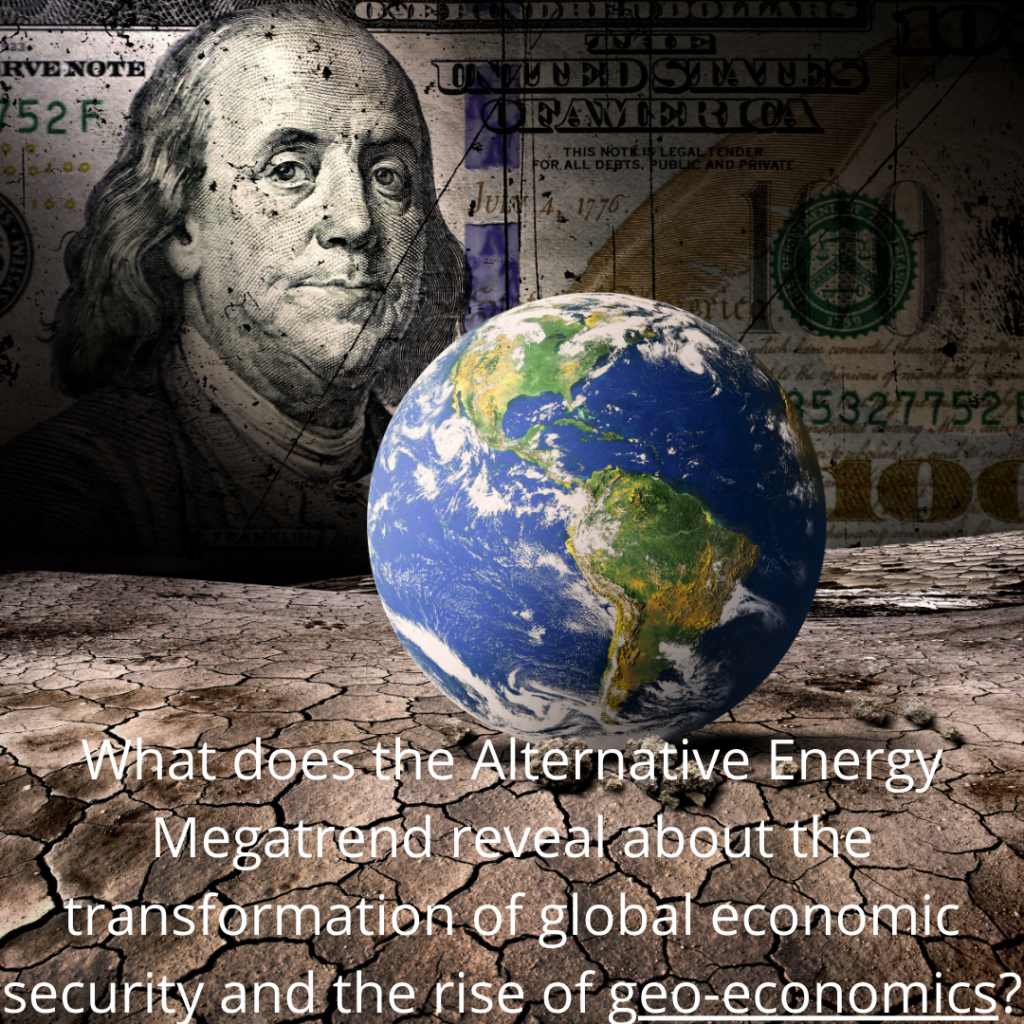Although The Prologue was published over a year ago, many of the concepts discussed in the book are more relevant than ever. Drivers of the alternative energy megatrend: geopolitics, energy security, and environmental security (to name just three) have been thrust center stage as the world faces new 21st century post-pandemic realities and great power aggression.
Economic security is another driving force of the alternative energy megatrend, as illustrated by the growing importance of affordable and accessible energy to avert crises and promote stable economic growth.
The war in Ukraine has created energy supply disruptions, resulting in energy price shocks that have contributed to rising global inflation and tighter monetary conditions, slowing global growth. To ameliorate energy inflation and shortages, the European Union is beefing up its renewable energy capacity in hopes that alternatives can do more to replace Russian gas. Last week, French President Emmanuel Macron called for a “massive acceleration” of renewable energy development in France. At the same time, the U.S. is offering direct consumer incentives to buy energy-efficient appliances, clean vehicles, rooftop solar systems, and invest in home energy efficiency via the Inflation Reduction Act.
The Modern Concept of Economic Security
Economic security is no longer limited to the prevention of economic manipulation by other actors; it now encompasses a wide range of considerations beyond immediate threats to sovereignty and the survival of the state.
Economic policy considerations, including growth, stability, development, and resilience to economic shocks, increasingly form a part of national security agendas and are vital priorities for geopolitical actors. The flexing of economic muscles—so-called geo-economics—is a relatively new term used to “describe the admixture of the logic of conflict with the methods of commerce — or, as Clausewitz would have written, the logic of war in the grammar of commerce.” Geo-economics has not replaced geopolitics; rather economic strength is a major foreign policy tool and determinant of geopolitical power.
Economic Statecraft
Economic statecraft, largely in the form of sanctions, dominates today’s foreign policy landscape. The United States, for example, has in place 38 sanctions programs, not including sanctions against individual people and those associated with the Russia/Ukraine conflict.
Today, we are witnessing widespread economic fallout associated with the war in Ukraine, much of it directly related to the need to alleviate Europe’s energy dependence on Russia. Macron stressed in a recent speech “The war changed everything… it disrupted the European model, because many countries were depending on Russian gas for (energy) production. And clearly, for the first time, energy has become a weapon of war.”
For many countries endowed with the “prize” of hydrocarbons, using energy as a lever allows them to exert influence on other nations. However, as the EU accelerated its embrace of the alternative energy megatrend, it became clear that this lever would not last forever. In fact, as Vladislaw Inozemtsev notes, fear of the inevitable disappearance of Russia’s energy influence may have bolstered Putin’s reasoning for invading Ukraine. With Europe still largely dependent on Russia’s energy supplies, Putin calculated that the West’s sanctions would be anemic as usual.
As discussed in The Prologue, deploying alternative energy technologies could reduce susceptibility to energy supply disruptions and price shocks, contribute to the alleviation of poverty, and mitigate broader economic volatility and global cyclicality. Furthermore, renewables can equip actors with new tools for relieving the threat of economic manipulation. The megatrend also contributes to the emergence of new industries, which could provide new opportunities for countries with one-dimensional economic development to diversify and change their growth paths. Already nearly 40 million people worldwide work in jobs related to clean energy, according to a report from the International Energy Agency. That number represents 56% of total energy sector employment.
Despite the hype, the megatrend’s impact on the future economic security landscape will depend on the economic viability of renewables and the breadth of externalities and distortions. To have a tangible effect on economic security, the alternative energy megatrend will need to achieve grid parity with fossil fuels. Making renewables economically viable will require reevaluation of the marginal cost and marginal price of energy. Such reevaluation will need to include all the pros and cons—from the added utility of energy on demand to the added cost of carbon emissions.
The Alternative Energy Market
Beyond the geopolitics and geo-economics of alternative energy deployment, it is important to consider the role of the alternative energy market. The value of the renewable energy market is set to grow from $880 billion to nearly $2 trillion by 2030. The growing importance of environmental and social governance (ESG) also puts pressure on companies to include climate change reduction as part of their business plans.
Government intervention in support of the megatrend may grow uncontrollably. This growing role could lead to imbalances and cross-sector side effects that could hinder the mitigating effects of markets. For example, “green tape” might lead to an artificial selection of winners and losers, as well as to the emergence of overwhelmingly dominant players and vested interests. That raises the question of how we can maximize the positive economic outcomes of the alternative energy megatrend and make the most of the market’s capacity to provide an efficient mechanism for the allocation of resources.
While government incentives may be still needed to launch nascent technologies, it’s important to stimulate research in diverse technologies and not put all the eggs in one basket. This is particularly true in the current race for renewable storage solutions. The Atlantic Council’s new report highlights that “the energy transition from fossil fuels to low-carbon energy sources will stimulate great demand for energy storage….” They recommend that policymakers “[s]hift the policymaking focus from lithium-ion mineral inputs to include a diversity of batteries and inputs.”
As great power competition, and even aggression, moves center stage in the 21st century, the future of the alternative energy megatrend will most certainly play a bigger role at the nexus of geo-economics and national security.
